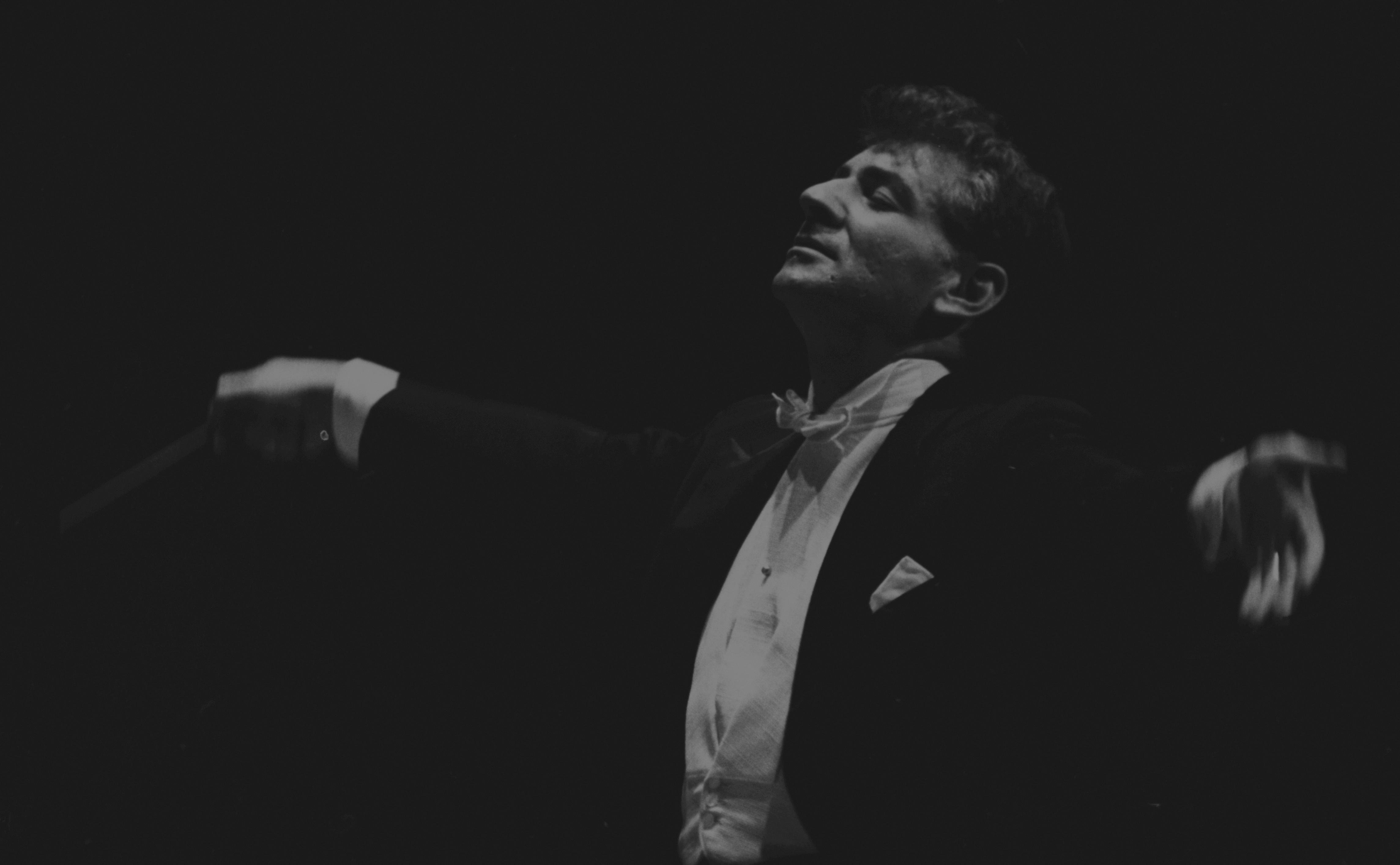The Helena Symphony concludes SEASON 63 on Saturday, May 5 at 7:30 p.m. in the Helena Civic Center with a celebration of the 100th birthday of Leonard Bernstein. The HSO&C celebrates the late composer, conductor, educator, and humanitarian with the diverse music of his career. From the concert hall to the big screen, operas to musical theatre, jazz to classical – the music of Bernstein’s West Side Story, Candide, Chichester Psalms, Wonderful Town, and film score to On the Waterfront honor and memorialize Bernstein’s unrelenting creative energy, fabulous contradictions, larger-than-life personality, and love affair with music.
Defining what is ‘American’ music remains a problem for all historians. Should it be popular or serious, vernacular or cultivated? The answer, of course, lies in all of the above: American music can, and should, be all of those things. The dilemma of American music is summarized, and even amplified, in the life, career, and artistic contributions of Leonard Bernstein. He himself could not decide which way to turn – in his musical career (pianist, composer, conductor, or teacher?), his musical style (popular or serious?), his religion, or his sexuality. As conductor, performer, and educator, Bernstein desired to keep symphonic music alive in a culture preoccupied with the technological advances of film, theatre, and rock and roll, and an age concerned with McCarthyism and racism. A great talent with a great ego, he craved indispensability, musically and personally, and he found it in the large, oversized works of Mahler, Sibelius, and Shostakovich. Bernstein seemed to enable even the most traditional of ensembles, like the Vienna Philharmonic, to rediscover and unleash the immortal and heroic qualities of the great composers.
Even Bernstein’s career as a composer involved dividing his loyalties between the world of ‘serious’ and ‘entertainment’ music. Bernstein found his own compositional style almost immediately: a vigorous style, juxtaposing romantic, lush melodic passages against jazz-slanted rhythms. The creative works of Leonard Bernstein bridge the gap between the academic and popular worlds of music, all of which maintained the merits of experienced craftsmanship. In all, he composed 3 ballets, 3 symphonies, 1 film score (On the Waterfront), 2 masses, several serenades and divertimentos, numerous works for piano and voice, 5 books, 6 musicals, (including On the Town, Wonderful Town, and West Side Story) and 3 operas, including his longest project, Candide.
On the Waterfront is Bernstein’s only film score, and highlights from the score open BERNSTEIN 100! Bernstein originally turned down the project, perhaps because he was not a fan of the film’s director, Elia Kazan, who also directed A Streetcar Named Desire. Kazan was known for being an informant in 1952 to Senator Joseph McCarthy’s House Committee on Un-American Activities, the anti-Communist political arm that exiled many performing artists. Bernstein was among 50 arts celebrities who, in 1947, signed a document condemning such committees and the paranoia about Communism. In 1954, Bernstein was convinced to compose the score to Kazan’s new film after he had a private screening with Kazan and lead actor Marlon Brando, along with a lucrative fee, and the promise of prominent billing in the film’s credits.
Commissioned by the 1965 Southern Cathedrals Festival for the English cathedral choirs of Chichester, Winchester, and Salisbury, Bernstein produced his Chichester Psalms with a Hebrew text (partly because it was the language of his limited religious upbringing and, perhaps, for a bit of ‘shock-value’). “This is perhaps Bernstein’s greatest work in so many ways,” explains Music Director Allan R. Scott. “Rather than reflecting the Anglican choral tradition for which the commission was intended, Bernstein used sounds that resembled West Side Story, capturing a loss of innocence in a place of anguish and despair.” In addition to an orchestra without woodwinds and chorus, the work also required a boy soprano, performed by boy soprano soloist Oliver Laughlin from Madeleine Choir School of Salt Lake City, UT. “With his Chichester Psalms, Bernstein suggests that faith might be grasped through the vision of child-like innocence, and that perhaps knowledge itself is pain,” explains Maestro Scott. “When Bernstein allows a sense of hope to emerge, he does so with hope in humanity, not in divinity.”
Bernstein captures the swinging excitement of New York City, specifically Greenwich Village, in the 1930s with one of his most impressive scores – Wonderful Town. Based on the 1940 staged comedy My Sister Eileen, the musical Wonderful Town was a collaboration between Bernstein and the musical comedy duo Betty Comden and Adolph Green (who wrote Singin’ in the Rain in 1952). Wonderful Town debuted on Broadway in 1953 and went on to win five Tony Awards, including Best Musical. The HSO performs the upbeat, jazzy overture to this fun musical comedy.
From its premiere, West Side Story was immediately recognized as a new plateau for the stage and it was born out of a dream team consisting of Bernstein’s brilliantly unified, nervously jazzy score, Arthur Laurents’ book, Stephen Sondheim’s lyrics, and Jerome Robbins’ electrifying choreography. “The score to West Side Story remains one of the greatest gifts to the theatre – it captures every emotion, tension, and hope that an audience experiences with the story itself,” says Maestro Scott. “As with many other Bernstein works, the ending is unsettling and riddled with anxiety.” The Helena Symphony Orchestra & Chorale, along with soloists Megan Pachecano, Jessica Fishenfeld, and Kevin Mathews perform many highlights from the popular musical.
HSO concludes the all-Bernstein concert with his operetta Candide – perhaps the most labored-over work in theatre history; there exist close to a dozen versions of the work, as it was edited and revised for nearly thirty-two years. The renowned playwright Lillian Hellman proposed to Bernstein that they adopt Voltaire’s 18th century satire on blind optimism, Candide, for an operetta on Broadway. The work satirized the fashionable philosophies of Voltaire’s day, especially the Catholic Church and the Inquisition. Hellman drew parallels between the Church’s sponsored purges with McCarthyism’s social and political outcasts of the 1950s. Most of all, Candide literally mocked the philosophy of optimism and the mindless acceptance of disaster.
“The conclusion of this all-American success story is painfully ambiguous,” summarizes Maestro Scott. “To the end, Bernstein remained a violently disjointed spirit – split not just between his loyalties to 20th century America and traditional Europe, but in his own person – between his sense of obligation (which led him to be very public about his Jewish heritage), his heterosexuality, and his seriousness as a composer; and his pursuit of pleasure, which led him to be a flamboyant conductor, a homosexual, a fantastic talker about music, and a Broadway showman. What a magnificent paradox that a man so disharmonious within himself would try to bring so many people together to create great lovers of music!”
The evening begins with the Symphony’s annual Closing Night Celebration from 5-7 p.m. in the Ballroom of the Helena Civic Center, featuring heavy hors d’oeuvres, open bar, live and silent auction, and music entertainment. The Bernstein 100! concert begins at 7:30 p.m. immediately following the pre-concert event.
Tickets for the Closing Night Celebration ($75 per person and group discounts for parties of 8 or more) and the concert ($52-$12 plus a $5 transaction fee) can be purchased online at www.helenasymphony.org, by calling the Symphony Box Office (406.442.1860), or visiting the Symphony Box Office located on the Walking Mall at the Livestock Building (2 N. Last Chance Gulch, Suite 1) between 10 a.m. and 4 p.m. Season tickets for the 2018-2019 Season are also on sale now!

